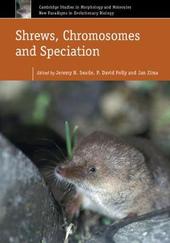
|
Shrews, Chromosomes and Speciation
Hardback
Main Details
| Title |
Shrews, Chromosomes and Speciation
|
| Authors and Contributors |
Edited by Jeremy B. Searle
|
|
Edited by P. David Polly
|
|
Edited by Jan Zima
|
| Series | Cambridge Studies in Morphology and Molecules: New Paradigms in Evolutionary Bio |
|---|
| Physical Properties |
| Format:Hardback | | Pages:488 | | Dimensions(mm): Height 253,Width 179 |
|
| Category/Genre | Genetics (non-medical)
Mammals |
|---|
| ISBN/Barcode |
9781107011373
|
| Classifications | Dewey:599.336135 |
|---|
| Audience | | Professional & Vocational | |
|---|
| Illustrations |
Worked examples or Exercises; 23 Tables, black and white; 8 Plates, black and white; 22 Halftones, black and white; 91 Line drawings, black and white
|
|
Publishing Details |
| Publisher |
Cambridge University Press
|
| Imprint |
Cambridge University Press
|
| Publication Date |
28 February 2019 |
| Publication Country |
United Kingdom
|
Description
The chromosome complement (karyotype) often differs between related mammalian species (including humans vs chimpanzees), such that evolutionary biologists muse whether chromosomal difference is a cause or a consequence of speciation. The common shrew is an excellent model to investigate this problem because of its many geographical races (potential species) differing chromosomally, and its several sibling species (recently speciated forms) that are also chromosomally different. This system is an exceptional opportunity to investigate the role of chromosomes in speciation and this volume reflects detailed research following these approaches. Highlights include the demonstration that chromosomal re-arrangements can be associated with complete loss of gene flow and thus speciation and that selection within species hybrid zones may lead to de-speciation rather than speciation. This book represents an extraordinarily detailed consideration of the role of chromosomes in speciation in one astonishing species, providing insights to those interested in mammalian diversity, chromosomal evolution and speciation.
Author Biography
Jeremy B. Searle is a Professor of Evolutionary Biology at Cornell University, New York. He has studied the evolutionary biology of small mammals, including research into colonisation history, speciation and chromosomal evolution. His Ph.D. was on the chromosomes of common shrew and he founded a series of meeting that met regularly for twenty-one years and stimulated much of the work in this book. P. David Polly is a vertebrate palaeontologist at Indiana University, Bloomington. He studies the evolution of mammals and other vertebrates in the fossil record, including trait-based studies of community response to environmental change, geometric morphometric analysis of evolution and morphology, phylogenetics, biogeography, and speciation on regional and continental geographic scales. Jan Zima is a Senior Scientist at the Institute of Vertebrate Biology, Academy of Sciences of the Czech Republic, Prague and Professor of Zoology at the Department of Zoology, Univerzita Karlova, Prague. He has studied chromosomal variation in various species of mammals and other vertebrates, and has attempted to imply cytogenetic findings to biodiversity, systematic and phylogenetic issues.
Reviews'I found Shrews, Chromosomes and Speciation fascinating, and an enjoyable read. This volume will be a welcome addition to the library of any evolutionary biologist or graduate student interested in how the interactions of chromosomes and the genome shape diversity.' Sally Potter, The Quarterly Review of Biology
|